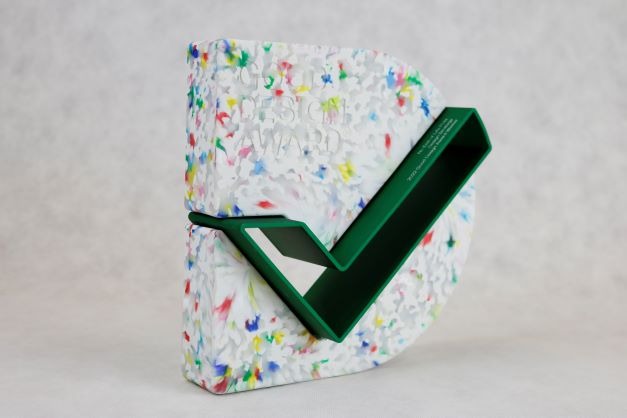Waste that was previously a landfill & pollution problem now has a new life! A new range of garden planters made of 100% post-consumer recycled (PCR) polypropylene is being made in Melbourne and sold through Bunnings Warehouse & Aldi.
The winners of Australia’s peak international design awards were announced on Friday 16th September at the 2022 Australian Good Design Awards. The Good Design Awards are the highest honour for design and innovation in the country and reward projects across 11 design disciplines covering more than 30 categories and sub-categories.
‘No End of Life’® Pots received a prestigious Good Design Award Winner Accolade in the Design Strategy category in recognition for outstanding design and innovation.
HomeLeisure has been tirelessly working on a solution to give a new life to waste that previously could not be sorted. The key design feature in their winning operation was to adopt recycled farmers and kerbside waste in the manufacturing processes, without the common use of virgin polymer, additives or colouring agents. In addition to this formula, HomeLeisure products reduce the need to manufacture new polymer and all of the energy and resources that this involves, contributing to the overall reduction of greenhouse gasses which foster climate change.
HomeLeisure’s recycled and recyclable garden pots and planters have led the way in sustainability within the industry. They have shaken up the expectations consumers have on the manufacturers, and our customers, retailers and the planet deserve no less.
“Our Trash Pots are a delightfully simple product, adapting to all Australian conditions. They will perform for many years to come and will not fade, chip or crack. Being both lightweight and strong, the pots are easily manoeuvred both inside and outside the garden. Additionally, the non-porous walls retain water for longer and as such promote healthier plant growth.”
Projects recognised with an Australian Good Design Award demonstrate excellence in professional design and highlight the impact a design-led approach has on business success and social and environmental outcomes.
The Good Design Awards Jury commented: “The team should be commended on how they were able to design a clear value proposition, anchored in the circular economy and a challenge to ensure every aspect of their value chain met the same standard.”
Dr. Brandon Gien, CEO of Good Design Australia and Chair of the Australian Good Design Awards said: “To be recognised with an Australian Good Design Award is a significant achievement, given the incredibly high standard of projects submitted in this year’s Awards. The Good Design Award is a valuable independent endorsement of professional design quality. It tells the world this project not only represents design excellence, but it also surpasses the criteria for design innovation and design impact.”
“We know that good design, when used effectively, can improve our quality of life and make the world around us better, safer, more efficient and more beautiful. It is clear from this year’s winning projects that investment in professional design delivers real impact – be it at a commercial, environmental or societal level. As our world transitions to a less-carbon intensive future, a design-led approach to solving problems and delivering meaningful impact is going to become more critical, Dr. Gien went on to say.
“The Good Design Awards recognise and celebrate the transformative power of design thinking to find innovative, customer-centric solutions to local and global challenges and this year’s Award-winning projects reflect just that. My sincere congratulations to all the designers, engineers, architects and innovators recognised in this year’s Awards – you deserve to be celebrated at the highest level,” Dr. Gien concluded.
HomeLeisure are so proud of their ‘No End of Life’® products and as a business are doing everything possible to help reach Australia’s goal of an 80% reduction in plastic waste entering the Australian environment by 2030.
